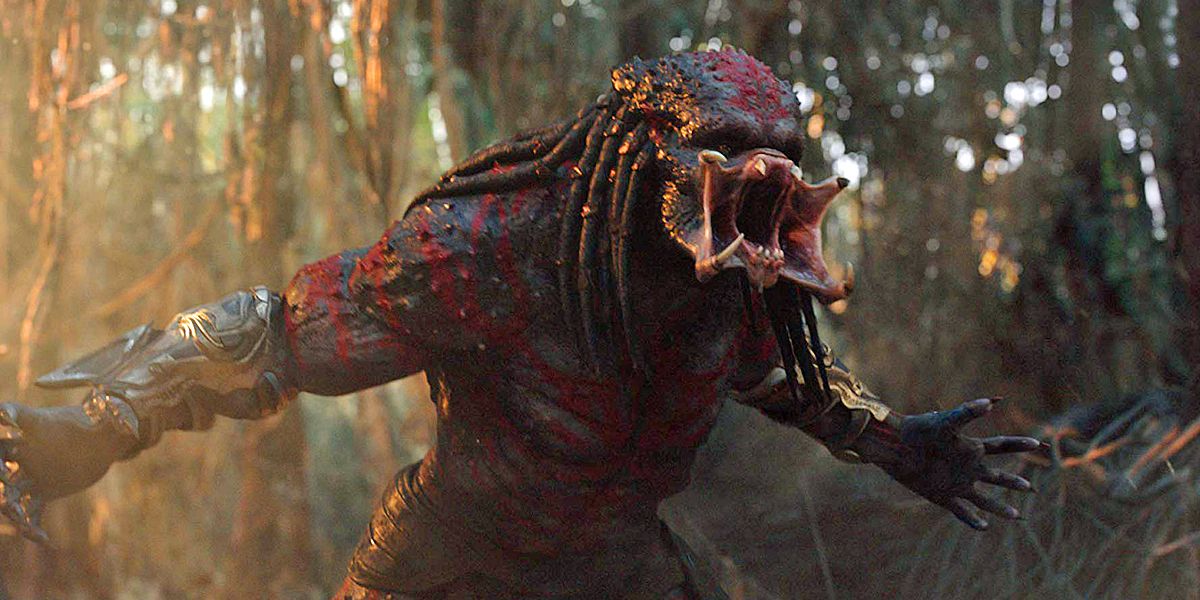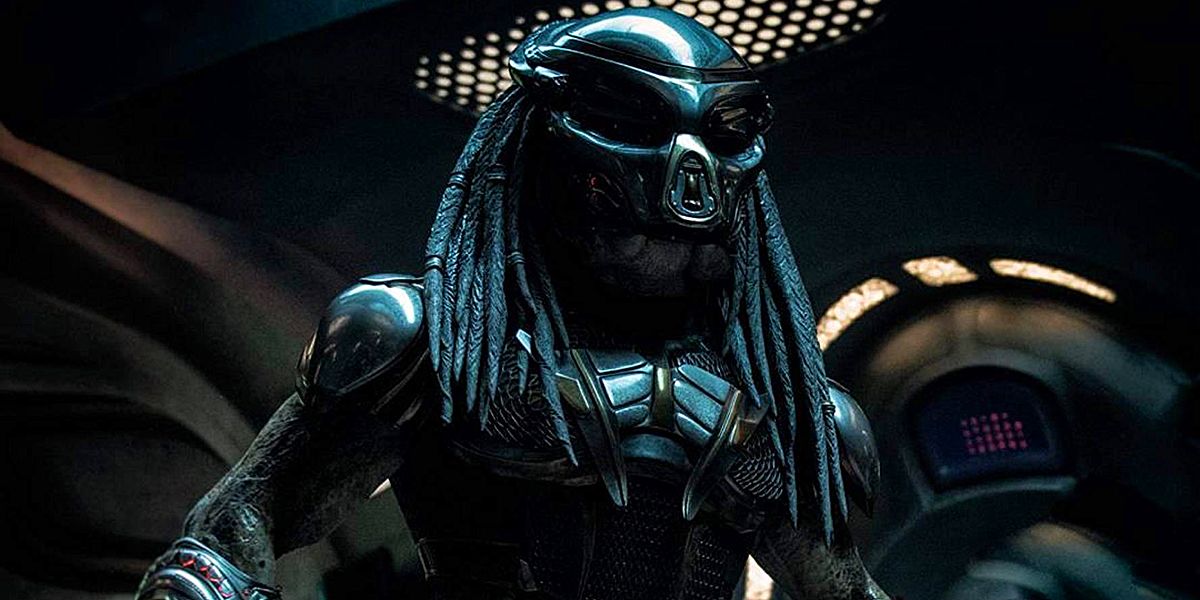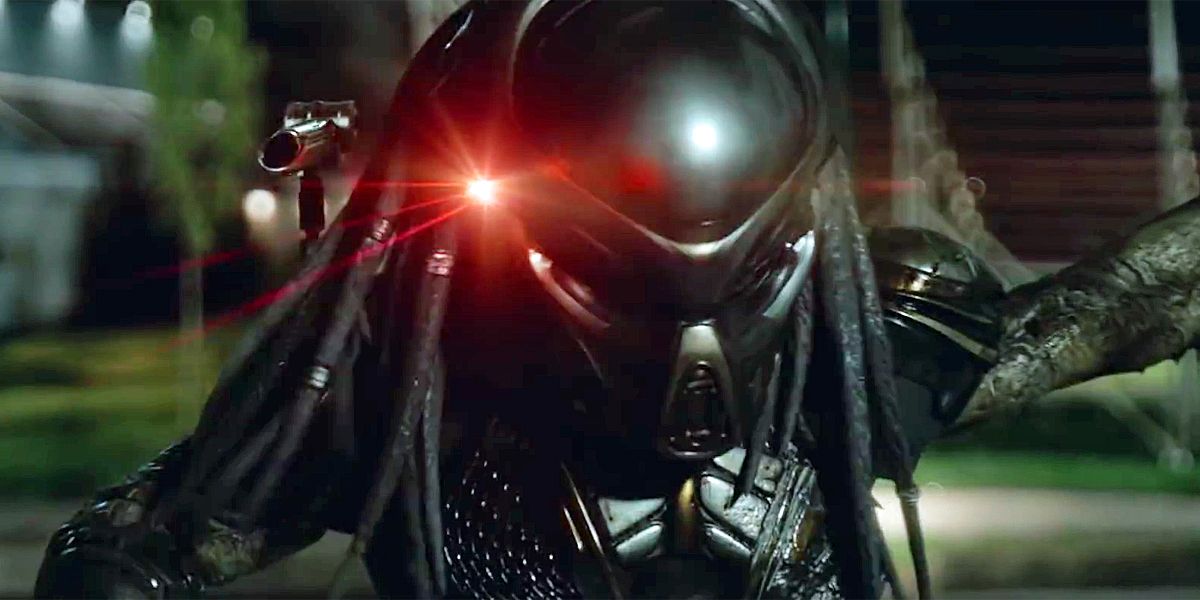WARNING: The following article contains spoilers for Shane Black’s The Predator, in theaters now.
Introduced in director John McTiernan's 1987 original, Predators, or Yautja, were established over the course of the early franchise films as a deadly alien species that lives for the thrill of the hunt. They set their sights on worthy prey, and then take skulls -- and sometimes spines -- as trophies. It's a relatively straightforward yet entertaining premise that doesn't require much backstory, or for the audience to be steeped in Predator lore. But Shane Black's The Predator changes that, and in doing so potentially weakens the franchise's premise.
RELATED: How The Predator Sets up a Sequel
It was long assumed Predators would target formidable humans simply because the aliens relish a good fight. Predator 2 established they've been hunting and killing humans since at least 1715, and Alien vs. Predator doubled down on their society valuing survival of the fittest as younger Predators battled Xenomorphs in a ritual. Now The Predator presents a new side of the story.
The galactic hunters aren't ripping out spines to advertise their prowess; they're doing it to collect DNA. Olivia Munn's character claims the extraterrestrials are taking traits from the "best" people before the human race is eventually wiped out by climate change. She also speculates they're gathering genetic material from other species, as hinted when one Predator grow san exoskeleton (a Xenomorph nod, perhaps?).
Black introduces the "ultimate" Predator, a roughly 11-foot creature that's stronger and more durable than an ordinary Predator, with technology apparently built into its body, allowing the alien to see in infrared and communicate with its off-world allies without the need for a helmet. This towering threat is obviously the result of the Yautja's gene -splicing experiments. Less obvious is the "regular" Predator, which possesses human DNA.
RELATED: The Predator's Ending, Explained
Based on what we've seen, Predators strive to be the ultimate hunters, so isn't enhancing their already-impressive physicality lessening the challenges they seem to value so much? After all, Predator 2 and Alien vs. Predator demonstrated the Yautja have a code of honor, and they seek challenges. Sure, the Predators appear to be about survival of the fittest, but gaining even more advantages over their prey feels dishonorable and out of character; it's obvious they don't want an easy victory.
Page 2: [valnet-url-page page=2 paginated=0 text='The%20Predator%20Makes%20Big%20Changes%20Without%20Much%20Explanation']
Is gene splicing only applied to a select few who serve certain roles within their society? After all, it's implied the "ultimate" Predator is a tracker who's sent after rogue Predators. But does that mean the Predators in the other films were attempting to collect DNA as well, or were they simply hunting for pleasure? Regardless of the answer, further exploration of the Predator mythology can be a double-edged sword.
Part of what made the original film so great was the suspense. Knowing less about the covert enemy made it even more frightening and the eventual reveals so enjoyable. The expansion of a mythos should never be off-limits, but making such a significant change to the Predators' society alters how we view them, and raises more questions than it answers. Everything shouldn't be spelled out in a movie, and leaving some mysteries is fine, but The Predator doesn't give enough information about its new premise, which makes it feel as if it's retconning the Predators' missions in the earlier films.
RELATED: How The Predator Transforms the Franchise Mythology
2010's Predators did a solid job of adding to the franchise mythology while embracing the elements that worked so well in the original. The changes were simple: There's a clash between two groups of Predators, and they have a "Game Preserve Planet" where they hunt opponents. If a Predator was killed, the others were quick to learn what went wrong and try different tactics the next time. Predators sprinkled in new information without seeming to make significant changes.
To be fair, Black is presumably revealing just one part of what is likely intended to be an elaborate society. The Predators from the other films could have no connection whatsoever to who the "ultimate" Predator works for in The Predator. But we don't know that for sure, and the movie seems to imply the species as a whole is moving forward with gene splicing, meaning it would affect the stories from the previous installments. Revealing Predators harvest human spines for their DNA -- as if Predators needed any traits from humans when they're already a physically and intellectually superior species -- potentially undercuts the franchise's straightforward premise. We'll just have to wait and see where the franchise goes from here.
Directed by Shane Black from a script he wrote with Fred Dekker, The Predator stars Boyd Holbrook, Trevante Rhodes, Jacob Tremblay, Keegan-Michael Key, Olivia Munn, Sterling K. Brown, Alfie Allen, Thomas Jane, Augusto Aguilera, Jake Busey, and Yvonne Strahovski. The film is out in theaters everywhere now.



